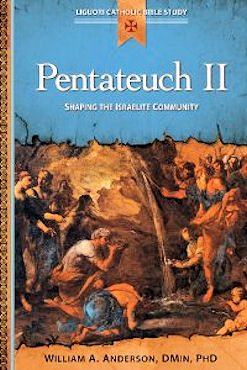
|
Posted November 12, 2013
Book: Pentateuch II: Shaping the Israelite Community Author: William A. Anderson Liguori Catholic Bible Study. Liguori, Missouri. 2013. Pp. 144 An Excerpt from the Jacket:
Leviticus, Numbers, and Deuteronomy are filled with the laws, rituals, and feasts of the Israelite people. Though many of the rules seem ancient by today's perspective, the laws themselves were life-giving for the Chosen People, as they helped the Israelites order their lives according to God's commands --- and in hope of God's promises. Journey with Moses and the Israelites and you will grasp more fully the reality of the gospels. As many Christian celebrations originated during this time, exploring these books of the Bible will enrich your understanding of how the Israelites' desert passage and their rituals set the stage for our Lord's work of redemption. An Excerpt from the Book: Leviticus (19:1-18) In this passage, we read about one's relationship with others. Many of the precepts given resemble those found in the Ten Commandments. The call to love father and mother and to keep holy the Sabbath is repeated, and the reason given is that the Law comes from the God of the Israelites. Concern for the poor is so important that some gleanings in the field and some grapes on the vine are to remain after the harvest for the poor to gather. The author adds many sins contrary to the Law of a holy and loving God. The list includes stealing, deception, swearing falsely in the name of God, robbery, insulting those who are deaf, tripping those who are blind, acting dishonestly, balancing partiality by not being too partial to the weak and showing high regard for the rich, slandering, hating one's kindred, revenge, and bearing grudges. Jesus will quote from this passage in the Holiness Code when he tells the people to love their neighbor as themselves. Lectio Divina Spend 8 to 10 minutes in silent contemplation of the following passage. The list for holiness given in Leviticus is long. In Jesus' era, many scholars of the Law attempted to shorten the list so people could grasp it more easily. This became a major debate. In the Gospel of Matthew, we read that a Pharisee comes to Jesus to test him by asking which commandment is the greatest. Jesus is astounds the Pharisee by taking a quotation from the Book of Deuteronomy (6:5) that speaks about the love of God with one's whole being and another from the Book of Leviticus (19-18) that speaks of love of neighbor as oneself and placing them together. Jesus is saying we cannot obey one without obeying the other. The Holiness Code for Christians is the code of love given by Jesus. To love God and neighbor as oneself would lead a person to follow the long list of precepts given in Leviticus. Table of Contents: Introduction to Liguori Catholic Bible Study Lectio Divina How to use this bible study companion Introduction: Pentateuch II 1. Ritual of sacrifice 2. A holy people, God's people 3. Grumbling in the wilderness 4. Encampment in Moab 5. Moses' first address 6. The great command 7. The Deuteronomic Code |
|
